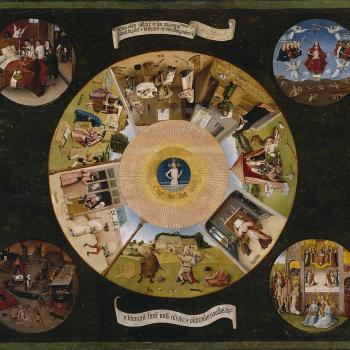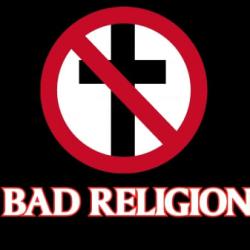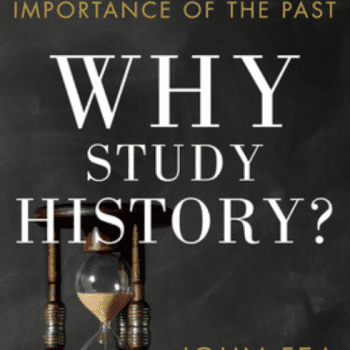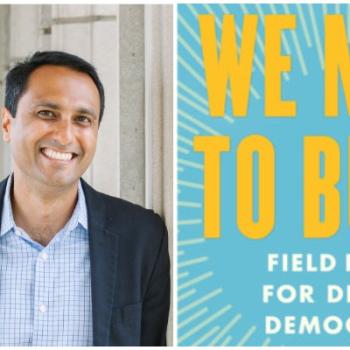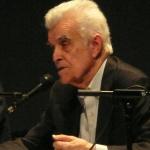Ever since Donald Trump’s inaugural address, Christian writers have hastened to argue that “America First” is not consistent with our faith. “‘America First’ is a perilous policy,” Griffin Jackson told readers of Relevant, “because it is rooted in self and selfish egoism. It is built on the premise that our needs are more important than your needs, that we’re right to value our own lives more than yours.””Christ, Not America, First,” insisted a Sojourners headline. And it’s not just progressive evangelicals. Here’s the pro-life Catholic ethicist Charlie Camosy:
President Donald Trump exudes an ideology of “America first.” There’s only one problem for orthodox Christians, however — the nation may never come first, because in first place must always be Jesus Christ and his Gospel. In that sense, “Trumpism” is actually a heresy.
I made that argument last month on this very blog. But while I continue to believe that “America First” as our president seems to mean it is inconsistent with Christian belief and witness, it’s also worth noting that the pre-World War II isolationist movement that pioneered that phrase actually had considerable support from a wide range of Christians.
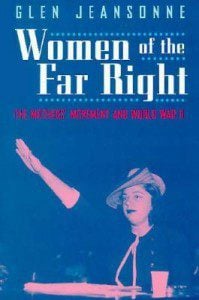
There were actually two such groups. The first, more explicitly Christian America First (founded 1939) was a right-wing women’s movement affiliated with Gerald L. K. Smith, a firebrand preacher who entered politics via his association with Huey Long and published the conservative magazine, The Cross and the Flag. In a 1994 article for the journal Diplomatic History, Laura McEnaney argued that the self-styled “Christian mothers” of that America First fused religion, patriotism, and isolationism into “a defense of the nuclear family structure and the conventional gender roles that made this movement’s vision of social and sexual purity possible and sustainable.”
More famous is the America First Committee (AFC), an ideologically diverse group founded in September 1940 by law student R. Douglas Stuart. (You can learn more about AFC from Philip, who posted about it last month at The American Conservative.) A member of the anti-war Yale Christian Association, Stuart’s father and grandfather were both executives at Quaker Oats, a company that plays a key role in Tim Gloege’s history of “corporate evangelicalism.”
Ideologically and religiously diverse, the committee’s membership included several Christian clergymen, including the Methodist bishop and temperance advocate Wilbur Hammaker and Catholic priest-scholar John A. O’Brien. While AFC historian Wayne Cole says that Hammaker was largely inactive, O’Brien served as one of the committee’s spokesmen, as in this August 1941 radio address:
I have abhorrence for Hitlerism, loathing for Stalinism, sympathy for the valiant people of Britain and for the victims of aggression everywhere. I have sympathy, likewise, for the common masses in every land including those of Germany, Italy and Soviet Russia because they are the helpless victims of the tragedy of war. But I have devotion to America and to our own people first of all. I believe that patriotism, like charity, begins at home.
O’Brien insisted that he was not speaking for the Catholic Church (or his Catholic employer, the University of Notre Dame), but he freely invoked the teachings of that hierarchy: e.g., “‘Nothing,’ declares the Holy Father, Pope Pius XII, ‘is gained by war that cannot be achieved by peace; in war all is lost.’ Time after time, His Holiness has set forth the ideals of peace which we all cherish. ‘I shall not relax either my efforts or my prayers,’ he declares, ‘for the cause of peace.’ Every day he is praying and struggling to bring peace to a war-torn world.”
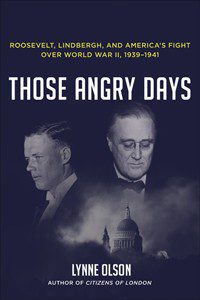 More problematic was AFC’s connection with another Catholic priest, Charles Coughlin. Via his radio pulpit and his anti-Semitic newspaper, Social Justice, Father Coughlin opposed American participation in a war that he blamed on an “anti-Christian conspiracy” of Jews, Communists, and the Roosevelt administration. (He too founded a women’s group in 1939: the National League of Mothers.) Committee leaders like Ruth Sarles warned supporters against having anything to do with Father Coughlin, and the Washington chapter banned members of his Christian Front. At the head of the AFC’s New York chapter the Georgetown-educated journalist John T. Flynn fought off an attempted coup by the Coughlinite priest Edward Lodge Curran. But for Lynne Olson, author of an excellent book on the debate over U.S. entry in the war, “the fact remains that many local chapters happily accepted Coughlin supporters and other extremists as members, with Coughlin himself urging his followers to join the anti-interventionist crusade.”
More problematic was AFC’s connection with another Catholic priest, Charles Coughlin. Via his radio pulpit and his anti-Semitic newspaper, Social Justice, Father Coughlin opposed American participation in a war that he blamed on an “anti-Christian conspiracy” of Jews, Communists, and the Roosevelt administration. (He too founded a women’s group in 1939: the National League of Mothers.) Committee leaders like Ruth Sarles warned supporters against having anything to do with Father Coughlin, and the Washington chapter banned members of his Christian Front. At the head of the AFC’s New York chapter the Georgetown-educated journalist John T. Flynn fought off an attempted coup by the Coughlinite priest Edward Lodge Curran. But for Lynne Olson, author of an excellent book on the debate over U.S. entry in the war, “the fact remains that many local chapters happily accepted Coughlin supporters and other extremists as members, with Coughlin himself urging his followers to join the anti-interventionist crusade.”
In the end, the person who did the most to associate the America First Committee with anti-Semitism was its most famous spokesman. Charles Lindbergh had little use for organized religion himself, but like many in the America First movement, he saw his homeland as a bastion of “Christian civilization” — one whose chief threat was Communism. While the Wehrmacht overran the Red Army in early July 1941, he told an America First audience in San Francisco that he would
a hundred times rather see my country ally itself with England, or even with Germany with all her faults, than with the cruelty, godlessness, and the barbarism that exist in Soviet Russia. An alliance between the United States and Russia should be opposed by every American, by every Christian, and by every humanitarian in this country.
Thousands packed arenas to hear the famous pilot, but two months later he dealt a critical blow to the committee. In a speech in Des Moines, Iowa, Lindbergh criticized the Jewish people for seeking war and warned that “[t]heir greatest danger to this country lies in their large ownership and influence in our motion pictures, our press, our radio and our government.”
Though he insisted that his friend “was not as anti-Semitic as some who seize the opportunity to criticize him,” Presbyterian pastor and Socialist presidential candidate Norman Thomas had to cut his ties with the AFC in the wake of Lindbergh’s controversial remarks. At the other end of the political and theological spectrum from Coughlin, Thomas had previously founded the Keep America Out of War Congress, but his Christian pacifism never fit well with the AFC’s calls for rearmament (albeit for hemispheric defense, not intervention).
The AFC was also a poor match for Christian Century editor Charles Clayton Morrison, who was too much of an internationalist to link his name with that of avowed isolationists. But in a May 1941 letter he had assured America First co-founder Robert Wood, “I am heart-whole in my agreement with the committee on the matter of keeping America out of the war, and will go to any length to further the great work which the committee is doing on this score… I adopt as my own the slogan of your committee, which I take to be in its fullest expression, Defend America First.” As late as October 23 of that year (in an editorial that Sarles included in her 1942 history of AFC), Morrison continued to argue that
America’s moral responsibility to humanity, as well as her own national interest, demands that this country be kept out of the war. In the face of an incalculable future, the United States should make herself strong enough within her own boundaries to defend the treasures of her civilization against whatever shapeless uncertainties lie hidden from her present view.
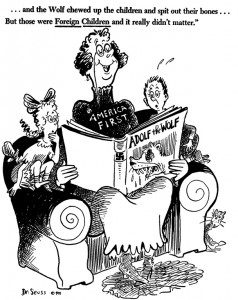
Morrison’s opposition to intervention helped prompt the neo-orthodox theologian Reinhold Niebuhr to found a new Protestant magazine in 1941. In the pages of Christianity and Crisis, he and other contributors articulated a Christian case against a neutrality predicated on either national self-interest or religious idealism. For example, in an early issue (June 16, 1941) he attacked the America First Committee — and the Christian pacifists who gave it moral cover:
One of the main planks in the “America First” platform is that we must rely purely upon our own resources…. We know of no religion which throws any light upon such strategic questions. In so far as there are moral implications in this problem of strategy we should have thought that a policy which emphasizes that we are “members of one another” would be a little nearer to a gospel ethic than one which rests upon American pride….
A religious perfectionism which shuns the realities of politics in one moment and embraces the sorriest political relativities in the next is the natural fruit of decades of sentimentality in which religious absolutes were regarded as easily achieved goals of political justice…
It is necessary for us who do not agree with this program not only to express our opinion that it represents bad politics, but also that it is derived from bad religion. The political confusions in it arise from religious illusions. This is the final fruit of a theological movement which thinks that the Kingdom of God is a simple extension of human history and that men may progress from the one to the other at any time if they have become sufficiently courageous, pure and self-less. All such illusions finally end in disaster. Communist utopianism ends in the sorry realities of Stalinism and this liberal-Christian utopianism ends by giving the dubious politics of “America First” the sanctity of the Sermon on the Mount.





